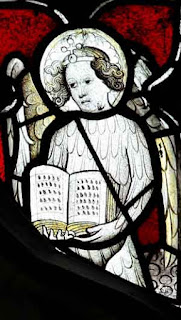Michaelmas is over for another year ... right?
The daily sanctus of the Te Deum joins our morning praise with that of the angels and archangels:
To thee all Angels cry aloud : the heavens, and all the powers therein.
To thee Cherubin and Seraphin : continually do cry,
Holy, Holy, Holy : Lord God of Sabaoth;
Heaven and earth are full of the Majesty : of thy glory.
The use of the Benedicite does not lose this emphasis, for it begins with 'O ye Angels of the Lord, bless ye the Lord'. The fact that each month's recitation of the Psalter also ends at evening of the 30th day (repeated in those months with 31 days) with Psalm 148's call 'Praise him, all ye angels of his: praise him, all his host', fittingly illustrates how the praises offered at Mattins and Evensong join those of the angelic hosts.
The Benedictus and Magnificat, as Hooker reminds us, are expressions of the Christological centre:
They are the first gratulations wherewith our Lord and Saviour was joyfully received at his entrance in the world by such as in there hearts, arms, and bowels embraced him (LEP V.40.2).
Both canticles are caught up with the angelic encounters which heralded the Incarnation, the annunciations to Zechariah and to the Blessed Virgin Mary. This is also the case with the Apostles' Creed, for its rehearsal of salvation history - Incarnation, Passion, Resurrection, Ascension - recalls that the holy angels are signs of and witnesses to our redemption.
Like the unfolding of the liturgical year, Benedictus, Magnificat, and Creed point to this ministry of the angels calling the Church afresh to the Christological centre. The presence of the angelic witnesses is part of the drama of the great festivals of Christmas, Easter Day, and Ascension Day. Angels feature in the Advent proclamation of the end of the ages, on the feast of Epiphany, and in the Passion of the Lord. When Mattins and Evensong set before us the Christological centre, the mystery of our salvation in the Incarnate, Crucified, Risen, and Ascended Lord, the angelic witnesses are close by, pointing to the Redeemer of humanity.
The petitions of the unchanging collects at Mattins and Evensong call to remembrance the Michaelmas collect: "so by thy appointment may succour and defend us on earth". In the ministrations of the holy angels to us, God answers our prayers:
Defend us thy humble servants in all assaults of our enemies ...
grant that this day we fall into no sin, neither run into any kind of danger ...
that we being defended from the fear of our enemies may pass our time in quietness ...
Light our darkness, we beseech thee, O Lord ...
Such daily petitions, morning and evening, are answered through the gift of the ministry of angels: in the words of the Michaelmas collect, "by thy appointment". As Calvin puts it:
angels are the ministers and dispensers of the divine bounty towards us. Accordingly, we are told how they watch for our safety, how they undertake our defence, direct our path, and take heed that no evil befall us (Institutes I.14.6).Yes, Michaelmas has passed for another year. But the ministry and presence of the holy angels has not. In Mattins and Evensong, day by day, we share in their praises, recall their witness to our redemption, and petition our Heavenly Father that they would minister to our needs in body and soul. Mattins and Evensong ensure that the glorious echoes of Michaelmas are heard throughout the year.





Comments
Post a Comment